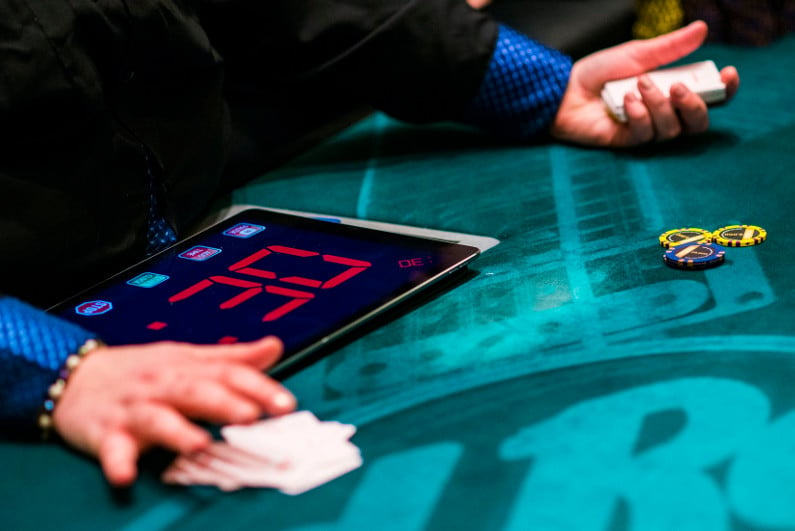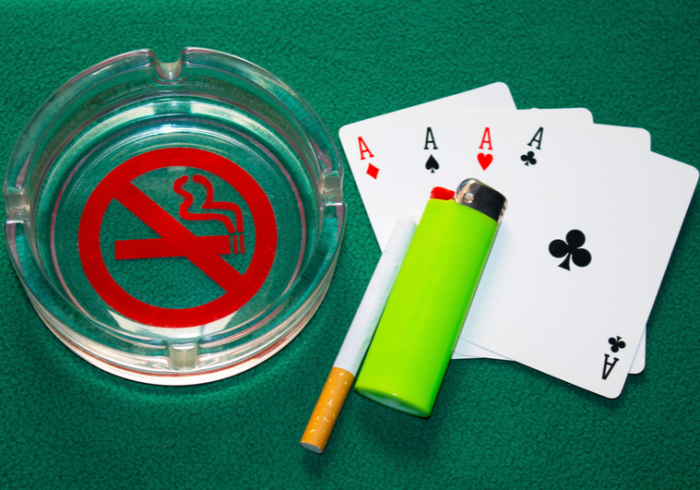Vogelsang calls the clock after 25 seconds
Last Sunday I had a small argument at the table with Dutch poker player and sensational fashionista Tom Vogelsang, who shouted “clock” at me 20 to 25 seconds into my decision as we stood right next to the bubble, just three seats away from the 2,200 cash entrance € ($2,380) FPS Paris High Roller. As a result, he disrupted my concentration while I was thinking about a very difficult spot with massive ICM effects. In my opinion, it was a rude, classless and unsportsmanlike thing to do to a player at a key moment in a tournament, right at the end of a tiring 14-hour day.
I immediately argued to her that it was “ridiculous.”
Suffice it to say I was angry. The sitting person was called to our table to judge and I immediately argued that this was “ridiculous.” She asked the dealer how long it had been, to which he replied, “30 seconds.” She replied, “Okay, so not enough time,” and walked away. I composed myself and weighed up the situation.
The chip leader at the table had opened to the hijack, as he had done in every unopened pot for about an orbit. I was in the cut off with 26 big blinds. I saw in my peripheral vision that a player at a nearby table had been eliminated. That meant there were 190 players left and 188 had been paid. From the moment the floorman walked away, it took about 30 seconds until I went all-in.
Vogelsang folded his button and immediately jumped up from his chair, laughed with another player at the table and said, “He just did that to make a point.” I was even angrier. Such a comment is completely inappropriate, at best a hasty remark and at worst a dig as it could influence the plot. The blinds folded, as did the original raiser, and I demanded the floor.
Heated words and a curious Parker
When the word came, I pointed to Vogelsang and, as reported by PokerNews Blogger David Salituro said: “Three out of the money, a difficult ICM spot, and this idiot calls the clock after 20 seconds.”
The speaker dutifully tried to play the role of peacemaker, but the situation was not calmed down. There was a heated back and forth between me and Vogelsang, and I told him in no uncertain terms that he was in the wrong. The audience begged us to stop arguing, so I said to them, “You were completely wrong, but if you apologize, it’s over.”
He refused to apologize, prompting Parker Talbot to speak from a nearby table. The following exchange occurred between Talbot and me:
“It’s never wrong to call the clock!”
“Stay out of this, Tonka!”
“People don’t call the clock often enough. I think it’s absolutely fine to call the clock whenever you want.”
“Whistle Crystal Meth Santa!”
That brings me to the question I want to try to answer in this article. Is it absolutely OK to call the watch whenever you want, or are there circumstances where it’s not OK?
The orbit before
In poker, context matters, and stalling for no reason is certainly one thing. So, in the interest of transparency, I would like to provide an overview of what happened in the previous round, where we went from 210 players remaining to 190.
Let’s just say there was a noticeable slowdown in the pace of the game
Our table played nine hands in the 23 minutes leading up to this encounter, not particularly fast, but not particularly slow for this point in the tournament either. There were a few larger stacks opening their games, and the rest of our table was mostly made up of medium sized stacks (in the 15 to 30 big blind range). For some middle stacks, including me, it took 10 to 12 seconds before the flop before they folded. There was certainly nothing unusual, but let’s just say there was a noticeable slowdown in the pace of the game.
On the fourth hand of this orbit (with about 202 players remaining), I was UTG1 and took about ten seconds before limping. Vogelsang moved up one spot and when the action came back to me, I hesitated for a minute before pushing my 23 big blind stack. He folded.
Two hands later (about 197 players left) I was in the big blind. The cut off opened, the button 3-bet, the small blind folded and I went into the tank. I had just over 27 big blinds and I’m happy to admit that I had an easy time with the five of diamonds. The thing is, though, there was a dynamic between the opening game and the three-better, and this was a cool opportunity to potentially win ten big blinds without a showdown.
Huge risk premium
Given the context, my shot would look very strong and it’s the kind of hand that offers reasonable equity if I face kings or queens. It’s even possible that the original raiser would have to fold pocket queens. While I was thinking about it (and partly plucking up the courage), Vogelsang called the clock. I had thought about the spot for about 100 seconds, so I had no objections. Unable to pull the trigger, I gave up halfway through the floorman’s countdown.
However, it is extremely difficult to determine optimal lines under strong ICM pressure
The next two hands I basically snapped pre-flop and then came the hand in question. There were 191 players left and we were three places away from a min-cash of €3,300 ($3,570). Decision making in poker is made extremely difficult by the risk premium, which can turn the strategy on its head. Given my background in SNGs and satellites, I would consider this area to be one of my particular strengths, but it is still extremely difficult to find optimal lines under heavy ICM pressure.
When I looked down at my hand, I was really unsure what to do with a hand that under normal circumstances is a slam-dunk three-bet induce, but in this situation becomes a shove or fold. I would have really appreciated a minute of uninterrupted thinking time, but unfortunately the person sitting next to me had other ideas.
The stalling problem
There is growing concern in poker that clever players are outsmarting bubbles and occasionally bringing the game to a halt, and that something must be done to stop them. I sympathize with tournament directors who have to police stalling, and with players who believe it is both fun and unsportsmanlike. It is certainly problematic that the rules in this situation are arbitrarily enforced, half supervised by the players themselves at the table, half supervised by the staff.
Shot clocks have become an ever-increasing part of poker and their use during bubble time is becoming increasingly popular. Matt Savage introduced a shot clock system with time extension at the WPT World Championship last December when we were still 30 players out of the money, and while I thought it would be a bit severe, especially for recreational players/qualifiers, it worked it definitely for quick preparation. bubble period.
Shot clocks have been a staple at tournaments with buy-ins of $25,000 and up for some time now, and that makes perfect sense in an environment where you want to emphasize sportsmanship in all aspects of the game. However, I would not like to see a similar development in areas with high amateur participation. However, I recognize that their absence is a problem.
It’s not always okay to call the clock
I’m going to extrapolate a bit here, but from what he said, I believe that Talbot’s position is that the way to solve this problem is to destigmatize and actually encourage tacting. I definitely think players should call the clock more than they currently do. However, I think they also have a responsibility to do so wisely. For example, a player facing a three-big blind decision on the river in Level 2 of a tournament should hurry up, while a player facing an over-bet check-shove on the river during his tournament life and With 11 players left, we deserve some leeway.
How much leeway? Well, that’s something the players have to decide together with the gaming staff at the table. Does that mean a certain level of discretion? Yes, it does. I would also like to add that there is a hierarchy of importance among these players, with players with a live hand who have chips invested in the pot taking precedence over an observer. That doesn’t mean a viewer can never call the watch, just that they should probably wait a little longer than if they had it in their hand.
I do think some punishment is in order.
Coming back to my hand, did Vogelsang have the right to call me after 20-25 seconds in the virtual bubble of a tournament? Absolutely not. This was particularly offensive given that I wasn’t dangerously short and had put my stack on the line six hands earlier. Should there be penalties for players who behave like this? Maybe that’s going too far, but when you add in his comments, “He just did that to make a point” right after he folded, I think some punishment is in order.
In conclusion, it’s not always okay to call the clock and I think this situation proves that. The moment I went all in, Vogelsang should have immediately realized that he was in the wrong and the correct response should have been to immediately apologize. Instead, he compounded his mistake with an inconsiderate comment.
I guess when God gave good manners, Tom Vogelsang was in line for high cheekbones.




